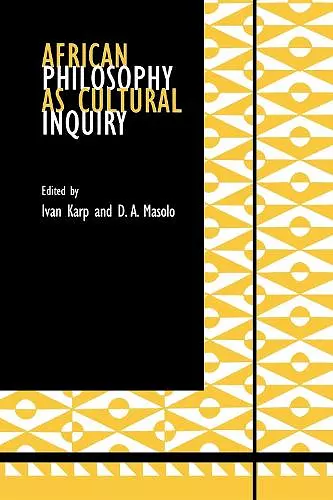African Philosophy as Cultural Inquiry
Ivan Karp editor D A Masolo editor
Format:Paperback
Publisher:Indiana University Press
Currently unavailable, and unfortunately no date known when it will be back

This book assesses the direction and impact of African philosophy as well as its future role.
What is the intellectual, social, cultural, and political territory of African philosophy? What directions will African philosophy take in the future? What problems will it face? In 10 probing essays by distinguished African, European, and American scholars, African Philosophy as Cultural Inquiry examines the role of African philosophy at the opening of the new millennium. Here philosophy cuts across disciplinary boundaries to embrace ideas taken from history, literary studies, anthropology, and art. Addressing topics such as the progress of philosophical discourse, knowledge and modes of thought, the relevance of philosophy for cultures that are still largely based on traditional values, and the meaning of philosophy to cultures and individuals in the process of modernization, this volume presents today's best thinking about the concerns and practices that constitute African experience. New views about personhood, freedom, responsibility, progress, development, the role of the state, and life in civil society emerge from these broad-based considerations of the crisis of the postcolonial African state. In a lively fashion this diverse book shows how philosophical questions can be applied to interpretations of culture and reveals the multifaceted nature of philosophical discourse in the multiple and variable settings that exist in contemporary Africa.
A conception of philosophy embedded in culture guides this anthology, divided into three categories (personhood, knowledge, and development), exploring issues in postcolonial African cultures. Part 1 has essays on the role secrecy plays in shaping personal identity in Sierra Leone, the function of moral notions of the self in Swahili medical practices in Zanzibar, and the dynamic view of the self exhibited in Chichewa linguistic practice. In part 2, which examines epistemological aspects of discourses in the forms of storytelling and music, and in the representation of arranged marriages, Karp and Masolo point out the deconstructive function of hidden meanings of praise—naming metaphors; Odoch Pido discusses Acoli concepts of the person; and Kratz explains the philosophic significance of gendered representation of shifts in identity and social relations in Okiek arranged marriages. In part 3 (the role of traditional culture in social change and modernization), Wiredu argues for retaining African social ethics to balance technical rationality of industrialization; Eboussi—Boulaga analyzes the term change, using the genetic concept of mutation to establish criteria identifying beneficial and evil mutations; Jewsiewicki reflects on the moral and social commentary in Kinshasa visual artist Cheri Samba; and Atieno—Odhiambo discusses Luo writers Samuel Ayany's and Paul Mbaya's efforts to synthesize Luo and Christian cultures. Recommended for upper—division undergraduate and graduate courses.November 2001
-- T. L. Lott * San Jose State UniversiISBN: 9780253214171
Dimensions: unknown
Weight: 458g
280 pages